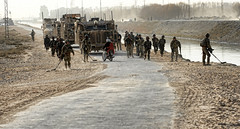 Image via Wikipedia
Image via WikipediaBattle for loyalty in lush Afghan valley
The final straw for Abdul Hakim was when the Americans bombed his village. Last year he lived for months caught between American guns and Taliban bombs, as his small village of Jeleran became the front line in the fight to control this valley, and to the south, Kandahar city.
Many months later, back in his home, he points to deep cracks within his mud compound walls. All the windows are gone. He says his home was damaged while he was still living there, when the Americans dropped a bomb nearby.
"When they dropped the bomb, people in the village thought that it was too difficult for them to continue living here and we all fled," he said. All 30 families left.
The Taliban moved in during the fighting and thick, deep orchards gave them cover - it was cool enough to sleep in there at night. The Americans' thermal cameras couldn't spy body heat through the thick canopy of pomegranate trees.
Captain Walter Tompkins saw half the men from his patrols wounded by the Taliban explosives. On one occasion, to travel 900m outside the patrol base took 11 hours.
$300,000 (£181,247) of US money has been set aside to bring the village back to life, to allow the 30 families who once lived here to return.
Clearing the IEDs was meant to take three days - it took eight.
An American funded cash-for-work scheme is employing hundreds of men throughout the valley, clearing canals and building roads.But officers paint a mixed picture pointing to a bidding war with the Taliban: "They pay $11(£6.6) to plant an explosive, we pay $6 (£3.6) for a day of work - but we pay six days a week."
Khair Mohammed is a local elder, respected by the community. The Americans like him too, they want him to become a village leader. But he is reluctant.
"Do you want me to tell you the truth? The truth is that Americans are paying money," he said.
"If Americans stop paying today, I am confidently telling you that nobody will help them tomorrow. They have gathered every individual around them by their money, otherwise no one will come to them even for a minute".
( The meme of the 'strategy' is 'winning hearts and minds.' Sounds like 'victory' is just around the corner, doesn't it ? Maybe priorities do reflect something else. )
Drone Wars: The Legal Debate Continues
http://www.wired.com/dangerroom/2010/03/the-drone-war-legal-smackdown
Inside the Rise of the Warbots
http://www.wired.com/dangerroom/2009/02/peter-singers-w
DR: How could an over-reliance on robots backfire on a military — especially in an insurgency-type war?
Singer: A story I love is Arthur C. Clarke’s "Superiority." Set in a distant future, the story is written from the perspective of a captured military officer, who is now sitting in a prison cell. He tries to explain how his side lost a war even though it had far better and newer weapons.
"We were defeated by one thing only — by the inferior science of our enemies," the officer writes. "I repeat, by the inferior science of our enemies." Clarke’s future officer explains that his side was seduced by the possibilities of new technology. It plans for how it wanted war to be, rather than how it turned out. "We now realize this was our first mistake. I still think it was a natural one, for it seemed to us that all our existing weapons had become obsolete overnight, and we already regarded them as almost primitive."
The robotics trend is revolutionary, but it also doesn’t change the underlying fundamentals of war (something the Rumsfeld-era network-centric folks never got). The fog of war remains. While you may have
Moore’s Law, you can’t get rid of Murphy’s Law. The enemy has a vote, so while your technology may be amazing, people will rapidly make adjustments and develop their own counters.
So, in something like insurgency, technology can prove to be critical to success; take the drone-heavy Task Force Odin, which helped crack the bombmaking networks in Iraq. But it isn’t a silver bullet. You still have human politics to master; the Sunni Awakening is just as critical to the "surge" story as Odin was.
Plus, there are all sorts of unpredictable effects, both short- and long-term, from using these systems. They are incredibly useful in carrying out precise, pinpoint strikes, without exposing soldiers to risk. So they negate many of an insurgent’s asymmetric advantages. But, when I went around interviewing people from the Middle East, for example, I also saw that there was a huge blowback effect from these technologies. As one news editor there put it to me [just after the
2006 war with Israel] while a drone buzzed overhead, "just another sign of cold-hearted, cruel Israelis and Americans, who are also cowards because they send out machines to fight us…. They don’t want to fight us like real men, but are afraid to fight. So we just have to kill a few of their soldiers to defeat them." Yikes.
( 'Hearts and Minds'. From 'Change You Can Believe In.' The psyops slogans...don't wear well. )










No comments:
Post a Comment